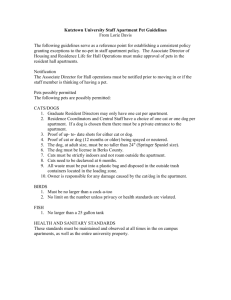On Residential Property
advertisement
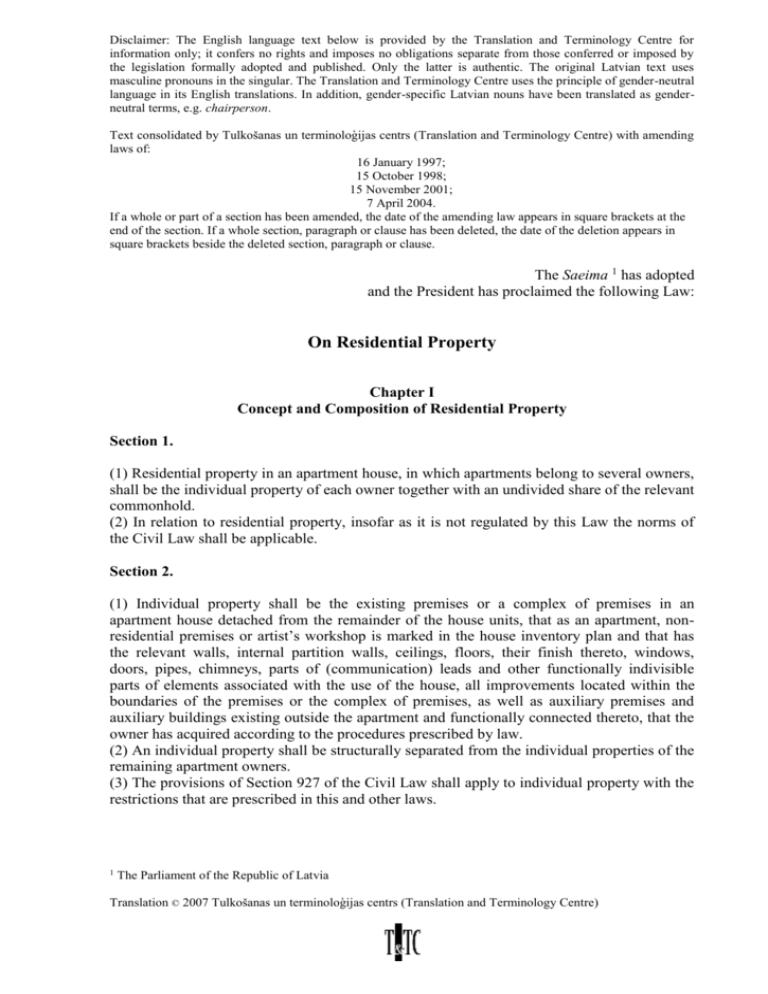
Disclaimer: The English language text below is provided by the Translation and Terminology Centre for
information only; it confers no rights and imposes no obligations separate from those conferred or imposed by
the legislation formally adopted and published. Only the latter is authentic. The original Latvian text uses
masculine pronouns in the singular. The Translation and Terminology Centre uses the principle of gender-neutral
language in its English translations. In addition, gender-specific Latvian nouns have been translated as genderneutral terms, e.g. chairperson.
Text consolidated by Tulkošanas un terminoloģijas centrs (Translation and Terminology Centre) with amending
laws of:
16 January 1997;
15 October 1998;
15 November 2001;
7 April 2004.
If a whole or part of a section has been amended, the date of the amending law appears in square brackets at the
end of the section. If a whole section, paragraph or clause has been deleted, the date of the deletion appears in
square brackets beside the deleted section, paragraph or clause.
The Saeima 1 has adopted
and the President has proclaimed the following Law:
On Residential Property
Chapter I
Concept and Composition of Residential Property
Section 1.
(1) Residential property in an apartment house, in which apartments belong to several owners,
shall be the individual property of each owner together with an undivided share of the relevant
commonhold.
(2) In relation to residential property, insofar as it is not regulated by this Law the norms of
the Civil Law shall be applicable.
Section 2.
(1) Individual property shall be the existing premises or a complex of premises in an
apartment house detached from the remainder of the house units, that as an apartment, nonresidential premises or artist’s workshop is marked in the house inventory plan and that has
the relevant walls, internal partition walls, ceilings, floors, their finish thereto, windows,
doors, pipes, chimneys, parts of (communication) leads and other functionally indivisible
parts of elements associated with the use of the house, all improvements located within the
boundaries of the premises or the complex of premises, as well as auxiliary premises and
auxiliary buildings existing outside the apartment and functionally connected thereto, that the
owner has acquired according to the procedures prescribed by law.
(2) An individual property shall be structurally separated from the individual properties of the
remaining apartment owners.
(3) The provisions of Section 927 of the Civil Law shall apply to individual property with the
restrictions that are prescribed in this and other laws.
1
The Parliament of the Republic of Latvia
Translation © 2007 Tulkošanas un terminoloģijas centrs (Translation and Terminology Centre)
Section 3.
(1) An existing unit belonging to a commonhold of the residential property shall be a unit of
the apartment house comprising of external walls, an apartment, the partition walls of nonresidential premises or artist’s workshop, roof, attic, staircases, basements, as well as
windows, doors, communications, facilities and other functionally indivisible elements
associated with the use of the house, that do not belong to an apartment, non-residential
premises or artist’s workshop, as well as a parcel of land, if this is not in the ownership of
another natural person or legal person.
(2) The provisions of Sections 1067-1072 of the Civil Law shall be applicable to the units
existing in the commonhold of the apartment house.
Section 4.
The status of residential property shall also be applicable to individual ownership by a
natural person or legal person for:
1) functionally separated non-residential premises and an artist’s workshop existing in
an apartment house, that is marked on the house inventory plan as separate premises or a
complex of premises; or,
2) non-residential premises or a complex of premises existing in an auxiliary building
or structure functionally belonging to an apartment house that is marked on the house
inventory plan as non-residential premises and is not functionally associated with any of the
apartments, artist’s studios or non-residential premises existing in the residential house.
[15 November 2001]
Section 5.
(1) Residential property shall be lawfully indivisible.
(2) Where several persons (co-heirs) inherit residential property, the provisions of Sections
715-719 - 719. and 721-723 shall be applicable.
(3) If residential property has come into the commonhold of several persons (by inheritance or
by other means) each co-owner may at any time request the division of the commonhold.
Disputes shall be adjudicated by a court according to Section 1075 of the Civil Law, not
adjudging the division of the commonhold into actual units.
Chapter II
Apartment Owner, His or Her Rights, Duties and Responsibilities
Section 6.
An apartment owner shall be a natural person or legal person who has lawfully
acquired residential property in an apartment house in which the apartments belong to several
owners, and registered this property in the Land Register.
Section 7.
An apartment owner may possess his or her property, obtain benefits from it, utilise it
at his or her own discretion for the propagation of property and generally use it in every way,
Translation © 2007 Tulkošanas un terminoloģijas centrs (Translation and Terminology Centre)
2
insofar as the owner is not restricted by laws and insofar as it does not create disturbances for
other apartment owners.
Section 8.
(1) It shall be the duty of all apartment owners to participate in the administration and
management of the units existing in the commonhold of the apartment house.
(2) For this purpose the apartment owners shall establish a society of apartment owners or
enter into a mutual contract according to the procedures prescribed by the Civil Law.
Section 9.
(1) An apartment owner is entitled to alienate or give as a present his or her residential
property, observing the procedures prescribed by laws, as well as mortgage it without the
agreement of the other apartment owners of the same house.
(2) Upon the alienation of residential property by any apartment owner, the remaining
apartment owners of such house shall have first refusal and pre-emption rights in cases when
they have previously expressed their wish to purchase the residential property in the relevant
apartment house according to the procedures prescribed by the statutes of the society or
mutual contracts. Rights of first refusal shall be executed according to the procedures
prescribed by the statutes of the society or in the mutual contract.
(3) If a residential property has come into the commonhold of several persons (by inheritance
or by other means) each co-owner may alienate his or her undivided share to any of the
remaining co-owners or – with their agreement – to another person.
Section 10.
An apartment owner is entitled to transfer the residential property into the use of
another person, by entering into an appropriate contract.
Section 11.
(1) An apartment owner has the right to lodge family members and other persons in his or her
apartment.
(2) The co-owner of an apartment, on lodging family members and other persons into the
residential property unit in his or her use, as well as transferring it over for use on the basis of
a contract, shall not require the agreement of the remaining co-owners, if all the co-owners
have not agreed regarding other procedures.
Section 12.
The apartment owner shall cover the necessary expenses that are associated with the
maintenance, service and repair of a residential house, its communications and facilities, as
well as maintenance of the parcel of land, proportionally to the size of his or her residential
property, likewise shall also settle accounts regarding public services received regardless of
whether or not the apartment owner is a member of the society of apartment owners
established for the administration and management of the existing units in the commonhold of
the house and whether he or she has or has not entered into a relevant contract. If the
apartment owner is the State or local government, it shall enter into a written contract with the
administrator of the apartment house regarding the covering of expenses for the
Translation © 2007 Tulkošanas un terminoloģijas centrs (Translation and Terminology Centre)
3
administration and management of the existing units in the commonhold proportionally to the
size of its residential property.
[15 October 1998]
Section 13.
(1) It shall be the duty of an apartment owner to treat with care the existing unit of the
apartment house in the commonhold, as well as observe the regulations for the use of
premises, the sanitary and fire safety norms.
(2) It shall also be the duty of an apartment owner to observe that the persons living with him
or her comply with the regulations.
Section 14.
(1) An apartment owner may not damage the units of communication existing in his or her
apartment and other parts of the functionally indivisible elements associated with the use of
the house.
(2) An apartment owner may not prohibit officials of the society of apartment owners or
relevant specialists to inspect the units of communication existing in his or her apartment and
implement activities that ensure the normal functioning of communications.
(3) An apartment owner without the agreement of other apartment owners is entitled
according to the procedures prescribed by regulatory enactments regulating building, to replan and rebuild his or her apartment and the units of communication existing therein, insofar
as this does not affect the interests of other apartment owners. If units of the apartment or
communications are re-planned and rebuilt, that are functionally indivisibly associated with
the use of the whole house, the agreement of the remaining apartment owners or the society of
apartment owners shall be necessary, that shall be executed according to the procedures
prescribed by the statutes of the society or a mutual contract, and the agreement of those
apartment owners that are not members of the society of apartment owners.
Section 15.
An apartment owner shall be responsible for the losses caused to other apartment
owners or to the society of apartment owners, if such has been established, and damage to
immovable property according to the procedures prescribed by civil law, the statutes of the
society or a mutual contract.
Section 16.
(1) Residential property may be alienated by court process in favour of the State or local
government, in whose ownership the relevant residential house was until privatisation, at the
same time evicting apartment owners, his or her family members and other persons that live
together with him or her, if the apartment owner systematically:
1) damages the building, as well as the communications or other elements of the
house;
2) utilises the apartment in such a way that causes disturbances to other apartment
owners; or,
3) violates the regulations for the use of premises, sanitary and fire safety norms,
thereby making it impossible for the other apartment owners of the same house to live in the
one house.
Translation © 2007 Tulkošanas un terminoloģijas centrs (Translation and Terminology Centre)
4
(2) Such sanctions against an apartment owner may also be applied if the persons living
together with him or her commit the violations specified in Paragraph one of this Section, but
the apartment owner does not perform measures in order to rectify such.
(3) A request regarding the alienation of a residential property may be raised by any
apartment owner, or the society established by the apartment owners, if the transgressor has
previously been cautioned in writing and within one year of receiving the caution has allowed
a new violation.
(4) Recovery may be directed towards a residential property in connection with payments
regarding public services, the costs of house maintenance, service and repair, if the apartment
owner does not have other property.
{15 October 1998]
Section 17.
(1) An apartment alienated in favour of the State or local government shall be sold at auction
for money in accordance with the Law On Procedures for the Alienation of State and Local
Government Property.
(2) Following his or her eviction from the apartment and the sale of the apartment, the
previous apartment owner shall be disbursed the market value of the residential property,
from which shall be deducted court costs, marketing costs and, if requests are registered, also
those losses which the apartment owner has caused to other apartment owners in the same
house, the society of apartment owners or other persons in connection with utilisation of the
apartment.
[15 October 1998]
Chapter III
Status of Family Members of Apartment Owners and Other Persons Lodging in the
Apartment
Section 18.
(1) For the purposes of this Law the family members of apartment owners shall be considered
to be the spouse, children of both spouses, while they are living in single household, as well
as persons whom the apartment owner has lodged in the apartment belonging to him or her
and whom he or she or his or her spouse shall maintain on the basis of law, a contract or a
will.
(2) A spouse and persons lodged in an apartment on the basis of affinity relations, following
the dissolution of marriage or the declaration of marriage annulment, shall lose the status of
family member of the apartment owner. Such persons shall retain the right to use the
apartment if there is a relevant agreement with the apartment owner.
Section 19.
(1) Family members of apartment owners and other persons who the apartment owner has
lodged in the apartment belonging to him or her, have the right in the same way as the owner
to use the residential and other premises if, upon their lodging, it has not been agreed
otherwise.
Translation © 2007 Tulkošanas un terminoloģijas centrs (Translation and Terminology Centre)
5
(2) Family members have the right without the agreement of the apartment owner to lodge in
the apartment their minor children, but for the lodging of other persons, the agreement of the
apartment owner shall be necessary.
(3) Family members, the maintenance of whom is the duty of the apartment owner or his or
her spouse, shall retain the right to use the apartment regardless of the length of their absence.
(4) Family members who have been conscripted into mandatory military service, shall retain
the right to use the apartment for such period.
Section 20.
(1) Family members of an apartment owner and other persons lodged in an apartment shall
have the same duties as the apartment owner in accordance with Section 13, Paragraph one
and Section 14, Paragraph one of this Law.
(2) Matters regarding the procedures for use of an apartment and regarding participation in the
covering of costs shall be settled by the apartment owner and his or her family members or
other persons lodged in the apartment by way of mutual agreement. Disputes in these matters
shall be settled by a court.
Section 21.
An apartment owner may not arbitrarily evict family members or other persons lodged
in an apartment, moreover, family members, the maintenance of whom is the duty of the
apartment owner, may be evicted only by allocating a different residential space appropriate
to his or her state of health.
Section 22.
(1) An apartment owner may request the termination of the right of family members to use the
apartment, if they:
1) do not perform the duties prescribed in this Law;
2) behave disrespectfully towards the apartment owner;
a) grossly insult him or her by words or deeds,
b) deliberately cause material damage to him or her,
c) threaten his or her life, or,
d) leave him or her in a state of helplessness, if it had been possible to help;
3) is on a long-term absence and has not agreed with the apartment owner regarding
the retaining of the right to use the apartment.
(2) The dissolution of marriage or declaration of marriage annulment shall give an apartment
owner the right to request the termination of the right to use the apartment by the former
spouse and persons lodged based on affinity relations, if the apartment was not the joint
property of the spouses (Section 89, Paragraph two of the Civil Law).
Section 23.
(1) An apartment owner may request the termination of the right to use the apartment by other
lodged persons (Section 11), if these persons:
1) do not perform the duties prescribed in this Law;
2) do not fulfil the agreement entered into with the apartment owner; or,
3) behave disrespectfully towards the apartment owner.
Translation © 2007 Tulkošanas un terminoloģijas centrs (Translation and Terminology Centre)
6
(2) If an apartment owner has transferred the residential property for use and entered into a
relevant contract regarding this (Section 10), on termination of the right to use the apartment,
the relevant provisions of the contract and law shall be applicable.
Chapter IV
Establishment, Alteration and Entering of the Residential Property in the Land Register
Section 24.
(1) A residential property shall be created by dividing an apartment house with an individual
structure parcel identifier into residential properties (a separate property together with the
undivided shares of the commonhold) on the basis of law, a judgment of court, a contract or a
will.
(2) The undivided share of the commonhold contained within the residential property shall be
the total area of the individual properties in relation to the total area of all individual
properties existing in the house.
(3) By dividing an apartment house into residential properties, which is located on land
belonging to the house owner, an undivided share of the parcel of land shall be included in
each residential property in the same amount as the undivided share of the commonhold
house.
(4) By dividing an apartment house into residential properties, which is located on land
belonging to the house owner and other persons, an undivided share of the parcel of land
belonging to the house owner shall be included in each residential property that is in
proportion to the area of the relevant apartment.
(5) By dividing an apartment house into residential properties that together with other
permanent structures (apartment house, single dwelling or non-residential structure) is
located on a parcel of land belonging to the structure owner and is registered together with
these as one registered unit in the Land Register, an undivided share of the parcel of land
belonging to the house owner shall be included in each residential property, that is in
proportion to the area of the relevant apartment. The undivided share to be included in each
such residential property of the commonhold of the house shall be calculated according to the
conditions in Paragraph two of this Section. For the remaining permanent structures
(apartment house, single dwelling or non-residential structure), which together with the
apartment house are registered as one registered unit in the Land Register, the area of the
undivided share of the parcel of land attached to the structure shall be proportionate to the
appropriate area indicated in the corresponding inventory plan of the structure. On performing
the attachment of a parcel of land to the specified structures, the provisions of Section 968 of
the Civil Law shall not be applicable.
(6) A residential property shall be established upon the recording of the property rights of the
apartment owner in the Land Register.
[15 November 2001]
Section 25.
(1) Residential houses not entered in the Land Register existing in the local government
balance sheet, which only contain apartments or apartments and artist’s workshops, except the
residential houses specified in Paragraph two of this Section, shall be recognised as the
property of the relevant local government. A residential house existing in the local
government balance sheet, in which undertakings or establishments are located, shall be
Translation © 2007 Tulkošanas un terminoloģijas centrs (Translation and Terminology Centre)
7
recognised as local government property, if the Cabinet has not taken it into State possession
by separate decree up to 31 March 1997. Residential houses existing in the balance sheets of
State undertakings and establishments shall be recognised as State property if they are not
handed over into local government possession by Cabinet decree. Pursuant to that specified,
residential houses shall be entered into the Land Register as State or local government
property.
(2) Residential houses that after 21 July 1940 were nationalised or otherwise unlawfully
alienated and in relation to which submitted applications have been received from former
owners or their heirs regarding the return thereof, shall not be entered into the Land Register
until such applications have been settled.
(3) A residential house may be entered into the Land Register, based upon a request for
recording thereof by the house owner, as well as upon a request by an apartment owner in the
cases specified in Paragraph four of this Section.
(4) Based upon the request by an apartment owner a residential house may be entered into the
Land Register, if it is privatised according to the procedures prescribed by the Law On
Privatisation of Cooperative Apartments or the Law On Privatisation of Agricultural
Undertakings and Collective Fisheries. In such case, in addition to the documents indicated in
the Law On Recording of Immovable Property into Land Registers, a statement from the
relevant local government commission for the privatisation of residential houses shall be
submitted. In it shall be indicated the number of storeys of the house, its total area, the total
area of apartments and the number of residential properties.
[16 January 1997; 15 October 1998]
Section 26.
(1) Residential properties shall be entered into the Land Register and the associated rights
thereof shall be recorded by the procedures prescribed by the Land Register Law and the Law
On Recording of Immovable Property into Land Registers, observing the following additional
conditions:
1) an apartment house shall be indicated in part one of the register unit of the Land
Register as immovable property with a cautionary remark that it is composed of residential
properties. In this part the number of each residential property shall also be indicated
separately, the total area of the apartments, as well as the undivided share of the commonhold
included in the residential property;
2) division part two of the register unit of the Land Register shall be established for
each residential property and the apartment number belonging to the owner shall be indicated
therein;
3) if a residential property is encumbered with property rights, a lien shall be
established or the establishment of a lien shall be ensured, such residential property shall be
established accordingly in part three or four of a separate register unit, making a cautionary
mark regarding this in the second part, granting the established part with a sign (letter), that
corresponds with the apartment number, and indicating the given name and surname of the
owner (for legal persons – the name thereof).
(2) A separate immovable property folder shall be established for each residential property.
[15 October 1998]
Section 27.
(1) Upon alteration of the total area of a separate property, the undivided shares of the
commonhold included in each residential property shall also be amended accordingly.
Translation © 2007 Tulkošanas un terminoloģijas centrs (Translation and Terminology Centre)
8
(2) A decision regarding the amendment of the undivided shares of the commonhold shall be
taken accordingly by the responsible authority of the society of apartment owners or a general
meeting of the apartment owners, based on the opinion of the Immovable Property
Assessment Service.
(3) The amendments performed in the composition of each residential property shall be
entered in the Land Register.
Chapter IV1
General Meeting of Apartment House Residential Owners
[15 October 1998]
Section 271.
(1) Only the general meeting of apartment house residential owners shall decide regarding the
administration and management of existing units in the commonhold of the apartment house
(hereinafter – general meeting of residential owners).
(2) The first general meeting of residential owners shall be convened by one apartment owner
or several apartment owners. This general meeting shall prescribe the procedures by which
further general meetings shall be convened and its decisions executed thereof.
(3) All apartment owners of an apartment house shall be invited to the general meeting of
residential owners.
(4) At the general meeting of residential owners, each apartment owner shall have as many
votes as there are apartments in his or her ownership. If more than half the existing apartments
in an apartment house belong to one apartment owner, he or she shall have not more than 50
per cent of the votes of the votes of all the members in attendance.
(5) The decision of the general meeting of residential owners shall be binding for all
apartment owners, if more than half the number of apartment owners have voted “for”.
Section 27.2
(1) The general meeting of residential owners shall decide regarding the form of
administration and management of existing units in the commonhold of the apartment house
according to the procedures prescribed by the society of apartment owners or the Civil Law
by way of a mutually entered into contract.
(2) The general meeting of residential owners may:
1) determine the cost of administration and management of existing units in the
commonhold;
2) approve a contract of residential owners and a management company;
3) decide regarding the commencement and termination of the heating season;
4) decide regarding the accumulation and utilisation of resources for capital repairs;
and,
5) resolve other matters that are associated with the administration and management of
the existing units in the commonhold.
Translation © 2007 Tulkošanas un terminoloģijas centrs (Translation and Terminology Centre)
9
Chapter V
Administration of Existing Units in the Commonhold of an Apartment House
Section 28.
(1) The society of apartment owners established for the administration and management of the
existing units in the commonhold of an apartment house, is a society of natural persons and
legal persons with a variable composition of members and capital.
(2) The procedures for the establishment, activities, reorganisation and termination of the
society of apartment owners shall be prescribed by this Law and other laws regulating
commercial activities, insofar as these are not in conflict with this Law, as well as the statutes
of the society.
(3) The society of apartment owners shall be a legal person and registered in the Enterprise
Register.
[7 April 2004]
Section 29.
(1) The administration and management of the existing units in one commonhold of an
apartment house may only be handed over to one society of apartment owners.
(2) One society of apartment owners may administrate and manage the existing units of a
commonhold in several apartment houses.
[15 October 1998]
Section 30.
(1) The statutes of the society of apartment owners shall be adopted at the foundation meeting
of the society, if two-thirds of the society founders have voted for this.
(2) The model statutes of the society of apartment owners shall be approved by the Cabinet.
Section 31.
(1) A society of apartment owners may be established by not less than five apartment owners,
if such a decision has been taken at the general meeting of residential owners in accordance
with Section 27.2, Paragraph one of this Law.
(2) The founders and members of the society of apartment owners may only be those natural
persons and legal persons that are apartment owners in the house that is administered and
managed by the relevant society of apartment owners.
(3) Members of the society of apartment owners shall be admitted according to the procedures
prescribed by the statutes.
(4) There shall be no right to refuse to admit as a member of the society an apartment owner
of the apartment house that is administrated and managed by the relevant society of apartment
owners.
(5) If a society of apartment owners has acquired in its ownership an apartment in an
apartment house that is under the administration of this society, it shall not become a member
of the society.
[15 October 1998]
Translation © 2007 Tulkošanas un terminoloģijas centrs (Translation and Terminology Centre)
10
Section 32.
(1) The highest administrative body of the society of apartment owners shall be the general
meeting of society members or – in cases prescribed by the society statutes – a meeting of
authorised persons. A general meeting of society members (a meeting of authorised persons)
shall establish an action group or appoint an administrator.
(2) The control and audit body of the society of apartment owners is an audit commission or
auditor, who shall be elected according to the procedures prescribed by the society statutes.
Section 33.
(1) At the general meeting of residential owners, each member shall have as many votes as
apartments are in his or her ownership. If more than half the existing residential properties in
a house belong to a society member, at the general meeting of the society members he or she
shall have not more than 50 per cent of the votes of the number of members in attendance at
the general meeting.
(2) The voting rights and procedures for voting of apartment co-owners shall be prescribed by
the statutes of the society of apartment owners.
Section 34.
(1) The resources of the society of apartment owners shall be comprised of regular and oneoff payments by the society members, the amount and procedures for payment of which shall
be determined according to the procedures prescribed by the society statutes.
(2) The society has the right to request from apartment owners, including those that are not
society members, payment of the relevant part of costs necessary for the maintenance of the
house and parcel of land.
(3) The resources utilised for the improvement of the house and parcel of land (applicable
expenses), shall be covered by apartment owners, who are not society members, on the basis
of mutual agreement.
(4) An apartment owner who has not participated in the covering of applicable expenses, is
not entitled to utilise the relevant improvements, if the statutes do not prescribe otherwise.
[15 October 1998]
Chapter VI
Final Provisions
Section 35.
Until the entering of an apartment in the Land Register, all the norms of this Law that
prescribe the rights, duties and responsibilities of apartment owners, shall apply to the
acquirer of the apartment, as well as the status of family members of the apartment owner and
other persons lodged in the apartment.
[16 January 1997]
Section 36.
Until the establishment of a society of apartment owners or the entering into of a
mutual contract, matters that are associated with the administration and management of
Translation © 2007 Tulkošanas un terminoloģijas centrs (Translation and Terminology Centre)
11
existing units in the commonhold of an apartment house shall be decided by the apartment
owners, by mutual agreement.
Section 37.
The provisions of Chapter III of this Law shall also be applicable in relation to
apartment houses that are in the ownership of one owner.
Transitional Provisions
1. The Cabinet shall approve the model statutes of the society of apartment owners and
regulations for the use of premises, as well as develop a draft law regarding amendments to
the Land Register Law.
2. With the coming into force of this Law, the Law On Amendments and Supplements to the
Civil Code of Latvia and the Apartment Code of Latvia (Latvijas Republikas Augstākās
Padomes un Valdības Ziņotājs, 1992, No. 20/21) and the Decision of the Supreme Council On
the Procedures for the Coming into Force of the Law of the Republic of Latvia On
Amendments and Supplements to the Civil Code of Latvia and the Apartment Code of Latvia
(Latvijas Republikas Augstākās Padomes un Valdības Ziņotājs, 1992, No.20/21), are repealed.
This Law has been adopted by the Saeima on 28 September 1995.
President
G. Ulmanis
Rīga, 12 October 1995
Translation © 2007 Tulkošanas un terminoloģijas centrs (Translation and Terminology Centre)
12
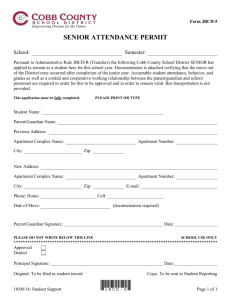
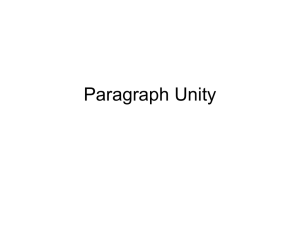
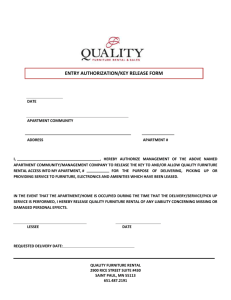
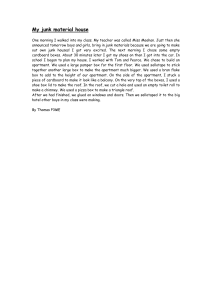
![Personal-Finance-Project[1]](http://s3.studylib.net/store/data/006625348_1-c8d6ffecfae5499cadbd8fcd703c8eae-300x300.png)

